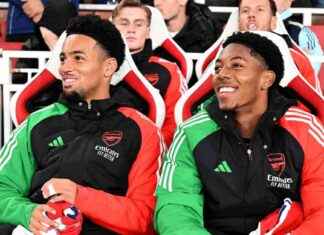Ocher buildings with elegant slightly worn facades, bridges perched on a tree-lined canal: the University of Ouagadougou offers a peaceful picture in a country in crisis.
It was here, in the amphitheater Gaddafi, a Libyan leader unseated by the French intervention of 2012 which had propagated the jihadist armed groups in the Sahel, that Emmanuel Macron had in 2017 delivered a “historic” speech to Burkinabe youth.
At the time, Pema Neya was still a student. This leader of a youth movement remembers this moment well. “We saw it as the speech of someone who wanted to preach something new,” he says.
Since then, jihadist groups have gained further ground, and French diplomacy is more than ever in the sights.
Encouraged by a nebula of youth movements, the regime of Captain Ibrahim Traoré, which came to power by a coup in September 2022, obtained the departure of the French ambassador and that of the special forces of Saber.
On Saturday, the French flag was folded up on the sly within the grounds of the Kamboinsin camp, where the Saber force was based, after fifteen years of presence.
Meanwhile, jihadist attacks are increasing and Burkina Faso is counting its dead.
But in the capital, the war still seems far away and security remains, after two coups in eight months.
Last in September 2022, images of the attack on the French embassy and protesters waving Russian flags made headlines.
However, Burkina Faso hosts a large French community and in Ouagadougou, there is no trace of hostility towards it.
The grievances against the former colonial power are certainly numerous and shared to varying degrees: refusal to recognize the crimes of colonization, arrogance, support for hated regimes.
But the prospect of a full divorce is not appealing.
“French leaders, to mobilize their public opinion, speak of anti-French sentiment in Africa. It’s not fair,” said Pema Neya. “The French are friends, brothers, they are very well received. Many are there, in our neighborhoods, they live the same realities, they understand what we are saying!”, But “young people no longer support this French policy condescending and paternalistic”.
“I criticize French politics, but I don’t care about Russians and there are plenty of people like me in Africa,” he adds.
The Burkinabè analyst Mahamoudou Sawadogo shares this opinion: “It is French policy that is decried, but not the French. France’s resigned attitude will perhaps calm things down”.
In a context of mobilization against jihadist groups, nuanced voices are however discreet. “There is a silent majority which does not necessarily have the possibility of expressing itself”, underlines the expert in international relations Oumarou Paul Koalaga. “When you browse social networks, the media, there is a confrontation of ideas and not everyone is in the perspective of a total and brutal break with France. Unfortunately, these people are not the ones who ‘we hear”.
The vocal minority, on the other hand, is satisfied with a first victory – the departure of the French soldiers – and unites behind the regime.
“The impossible has become possible,” rejoices Lassané Sawadogo, leader of the Front for the Defense of the Homeland (FDS), one of the pro-regime movements which organize regular demonstrations where Russian flags bloom.
“I ask the French to understand that we have no problems with them, even President Emmanuel Macron we do not hate him, but we hate this system that his ancestors imposed on us and of which he is the continuity”, assures- he.
A “system” accused of being the cause of most of the country’s ills, with the backing of conspiracy theories which still arouse widespread support among the population.
“These movements make us uncomfortable, the young people who follow them are mostly illiterate: as soon as we criticize them, they accuse us of being pro-French”, worries a civil society official, nevertheless favorable to the regime, on condition of anonymity.
According to Oumarou Paul Koalaga, “the regime needs the support of a certain opinion, but in fact, it does not want to go further” and “cooperation” with Paris “continues”.
Lassané Sawadogo, he does not lower his guard: “Africans have understood that independence cannot be negotiated, it is torn off. And woe to Macron if he did not understand that and that all of Africa rebels (…) It can go wrong”.
22/02/2023 09:59:02 – Ouagadougou (AFP) – © 2023 AFP







